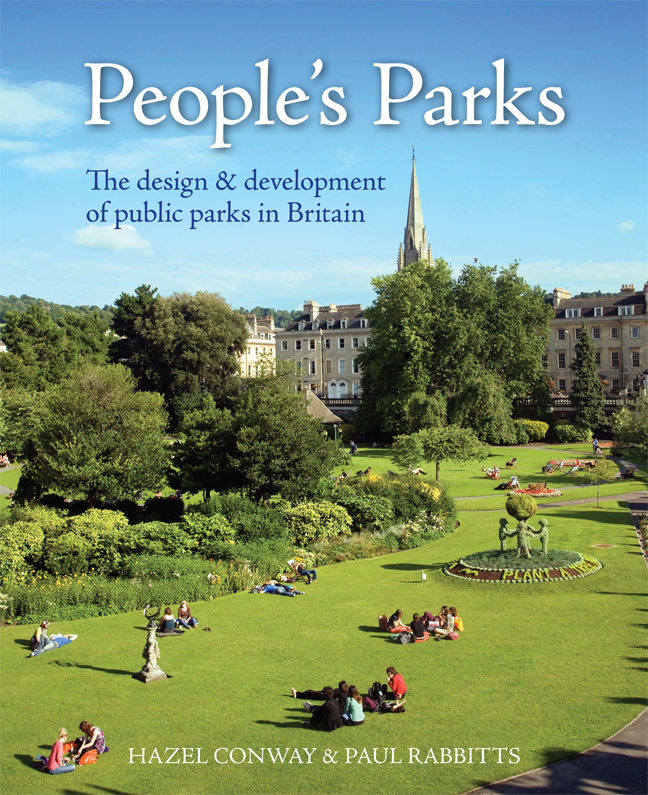Book contents
- Frontmatter
- Dedication
- Contents
- Miscellaneous Frontmatter
- Preface
- Acknowledgements
- Foreword
- A Word from Parks Professionals, Politicians and Parks Organisations
- Introduction: Dr Hazel Conway (1991)
- 1 Public Parks and Municipal Parks
- 2 The Need for Parks
- 3 Pioneering Parks Development
- 4 The Park Movement
- 5 Design and Designers
- 6 Lodges, Bandstands and the Cultivation of Virtue
- 7 Local Pride and Patriotism
- 8 Planting and Park Maintenance
- 9 Permitted Pastimes
- 10 Recreation Grounds, Parks and the Urban Environment
- 11 Public Parks, 1885–1914
- 12 Later Municipal Park Designers
- 13 Garden Cities and the New Towns Movement
- 14 Sport, Physical Activity and Recreation in Public Parks in the Inter-war Years
- 15 Parks Management – a Changing Perspective
- 16 Decline, Revival and Renewal – the Role of Parks into 21st-century Britain
- Appendix 1 Summary of main legislation promoting early park development
- Appendix 2 Chronology of main municipal and public park developments between 1800 and 1885
- Notes
- Bibliography
- Subscription List
- Index
9 - Permitted Pastimes
Published online by Cambridge University Press: 22 February 2024
- Frontmatter
- Dedication
- Contents
- Miscellaneous Frontmatter
- Preface
- Acknowledgements
- Foreword
- A Word from Parks Professionals, Politicians and Parks Organisations
- Introduction: Dr Hazel Conway (1991)
- 1 Public Parks and Municipal Parks
- 2 The Need for Parks
- 3 Pioneering Parks Development
- 4 The Park Movement
- 5 Design and Designers
- 6 Lodges, Bandstands and the Cultivation of Virtue
- 7 Local Pride and Patriotism
- 8 Planting and Park Maintenance
- 9 Permitted Pastimes
- 10 Recreation Grounds, Parks and the Urban Environment
- 11 Public Parks, 1885–1914
- 12 Later Municipal Park Designers
- 13 Garden Cities and the New Towns Movement
- 14 Sport, Physical Activity and Recreation in Public Parks in the Inter-war Years
- 15 Parks Management – a Changing Perspective
- 16 Decline, Revival and Renewal – the Role of Parks into 21st-century Britain
- Appendix 1 Summary of main legislation promoting early park development
- Appendix 2 Chronology of main municipal and public park developments between 1800 and 1885
- Notes
- Bibliography
- Subscription List
- Index
Summary
Parks were places where people could enjoy the open air and the beauty of the flowers and trees, and through a variety of activities become physically, socially and morally improved. Generally, these activities tended to be rather sober in comparison with those offered by the pleasure gardens, but there were exceptions to this, particularly on special occasions such as a park opening. Three days of celebrations marked the opening of Derby Arboretum on 16 September 1840. The corporation's procession to the arboretum and the official opening ceremonies were followed the next day by a second procession, this time of trades and societies, and the celebrations included a balloon ascent, dancing and a firework display. On the third day, children's day, there were sports, games and more dancing. Subsequently, 15 August, the birthday of the donor Joseph Strutt, was celebrated by a general half-holiday, with a procession, massed bands and special attractions in the arboretum. At the opening of Birkenhead Park on 5 April 1847, the crowd, estimated at 10,000, enjoyed the sports, the bands and the Lancashire bellringers who performed on the upper storey of the boathouse, but the highlight of the day was the rural sports competition. This included sack, hurdle, foot and blindfold wheelbarrow races, races for women, and other competitions such as a grinning match, eating a bowl of ‘stirrah’ or porridge, and catching the greasy pig. The pigs were prepared for this ordeal by shaving them and soaping their tails. To enable people from the surrounding towns to enjoy the opening of People's Park, Halifax, 10 years later, special excursion trains were laid on. There was a general holiday, a huge procession to the park led by the Sixth West Yorkshire militia followed by nine bands, and thousands came from Huddersfield, Bradford and Leeds to participate in the feasting which lasted into the small hours: ‘There never was a more happy day in all our town's history than 14th August. Gladness beamed in every eye; pleasure ruled in all hearts; happiness filled every mind, joy lighted up every individual's face.’
Parks were places which large numbers of people could use and they did so, on special occasions and on ordinary Sundays.
- Type
- Chapter
- Information
- People's ParksThe design & development of public parks in Britain, pp. 151 - 168Publisher: Boydell & BrewerPrint publication year: 2023

